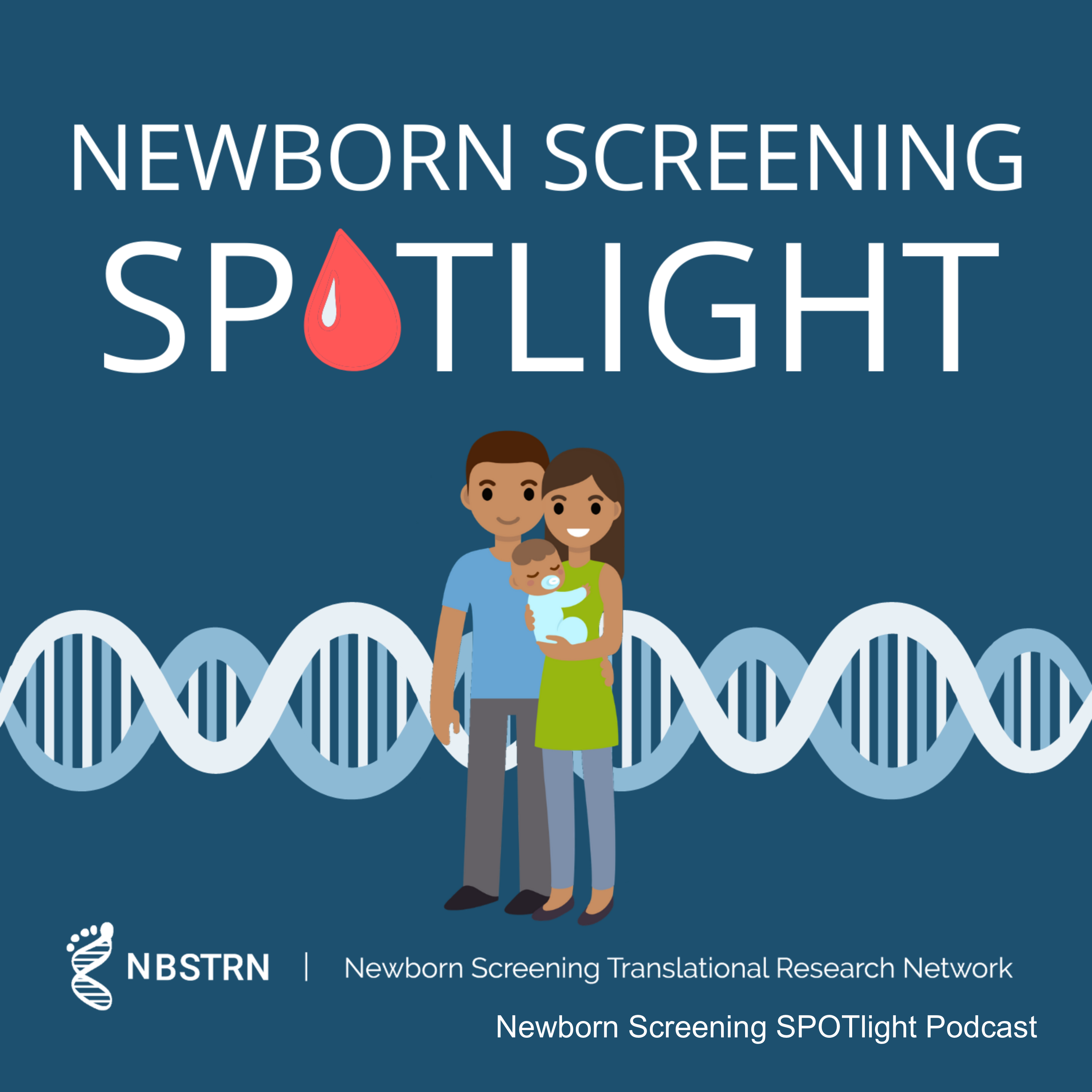
6.4K
Downloads
27
Episodes
This podcast is about the advancement of rare disease research told by health professionals, researchers, parents, and advocates. This podcast is for you to learn how newborn screening research saves the lives of babies every day through discoveries of new technologies and treatments. You will hear stories from experts who treat babies, the families who care for them, and the researchers who make it all happen.
Episodes
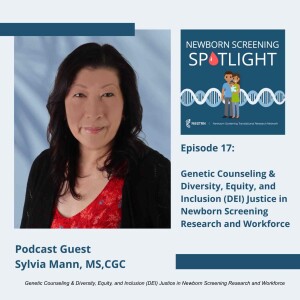
Wednesday Nov 23, 2022
Wednesday Nov 23, 2022
Welcome to the Newborn Screening Spotlight! Today’s episode highlights the important role genetic counselors play in the diagnosis, care, and lifelong management of newborns diagnosed with a disease through newborn screening. Genetic counseling helps families better understand available treatments and resources, and our guest, Sylvia Mann is a genetic counselor who wears many hats, three to be exact, in her roles as the Supervisor of the Genomics Section of the State of Hawaii Department of Health, the Co-Director of the University of Hawaii Pacific Basin Telehealth Resource Center, and the Project Director of the Western States Regional Genetics Network. Sylvia’s career in genetic counseling began when she received her Master of Science in Human Genetics and Genetic Counseling from Sarah Lawrence College in New York, and, this year in 2022, her over 30 years of efforts to expand and improve NBS in one or more states were recognized with the George Cunningham Visionary Award in Newborn Screening. During today’s podcast Sylvia shares the ways visionaries like Dr. Cunningham played in her journey to train and inspire current and future genetic counselors. She also shares the exciting news that she will be developing a new program to train genetic counselors using an innovative model at Creighton University beginning in 2023. Sylvia’s decades of empowering parents, families, patients, and advocates from diverse backgrounds, she lives in Hawaii after all, has resulted in professional with a rare combination of genetic expertise, sincere empathy, and a tireless work ethic that has resulted in important conversations and discussion of diversity, equity, inclusion, and justice taking place.
Interview Questions:
1. Congratulations on your recent award of George Cunningham Visionary Award in Newborn Screening at the APHL NBS Symposium. It is given to someone who has made the greatest contribution to expanding or improving the screening of newborns by public health agencies in one or more states. This year’s award recipient is you, Sylvia. In the early 1960s, many states mandated NBS within their health departments and/or state laboratories to provide coordination and oversight for NBS. Can you share with our listeners about the newborn screening system in the state of Hawaii and any specific similarities and differences on the screening system different between states?
2. In one of our podcast episodes titled “Getting on the List” which was led by our co-host Dr. Brower, we highlighted the nomination process of getting a condition added to the RUSP. However, once the condition is on the RUSP, the process of implementation of the new condition is a bit complex and seems to differ between state to state. After a new condition is added to RUSP, can you help demystify the process to our listeners - what are the next steps in state-wide implementation of screening for that new condition in general and in the state of Hawaii? (Perhaps, Sylvia you can discuss and reference your public/private partnership paper here)
3. You are currently the Supervisor of the Genomics Section of the State of Hawaii Department of Health, the Co-Director of the University of Hawaii Pacific Basin Telehealth Resource Center, and Project Director of the Western States Regional Genetics Network. Can you share with our audience how you are involved with newborn screening in these different positions?
4. November is a special month, beside the time for Thanksgivings. November is the month of Family History Awareness as well as Genetic Counseling Awareness. You are one of the very few genetic counselors working in a state public health agency. Can you tell our listeners how you got interested in a career as a genetic counselor and how does genetic counseling play a role across the lifespan especially in public health?
5. According to the 2022 professional status survey by the National Society of Genetic Counselors, 90 percent of genetic counselors in the United States are white, and the percentages of genetic counselors identifying as Black or Hispanic/Latino/Latinx1 are not proportionally representative of the general U.S. population. Why do you think there is a lack of workforce diversity?
6. In your publication, creation of the Minority Genetic Professionals Network to increase diversity in the genetics work force, you described that the Health Resources and Services Administration funded Western States Regional Genetics Network to create a Minority Genetic Professionals Network (MGPN) to recruit and mentor high school and undergraduate students to enter genetic professions such as genetic counseling. How can our listeners learn more about this network and get involve?
7. Are you involved in training the next generation of genetic counselors, and what do you tell them about newborn screening research?
8. Do you have any stories of inspiration that keep you going? perhaps, any story you can share with de-identified information)
9. What does NBS research mean to you?
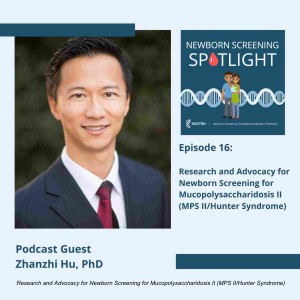
Thursday Oct 27, 2022
Thursday Oct 27, 2022
Today, we are joined by Dr. Zhanzhi Hu (aka Mike) who is the co-founder and President of Project GUARDIAN, a nonprofit organization with the mission of advancing genomics-based newborn screening where they have a mission of genome sequencing 100,000 babies in New York City. His dedication and motivation to ensuring all babies have the best chance to live a healthy life stem from his own experience as a parent of two children with a rare disorder called MPS II and also known as Hunter Syndrome. He is an ardent advocate for newborn screening and works tirelessly to bridge the gap between advanced technologies and the critical need for the expansion of the newborn screening public health program. Mike is also an Adjunct Associate Researcher at Columbia University where he conducts newborn screening-related research. Dr. Hu received his Ph.D. degree in Molecular Genetics and Microbiology from the University of Texas at Austin and his B.S. degree in Cell Biology and Genetics from Peking University. He is currently on the Steering Committee and chair of the researcher needs workgroup at NBSTRN. He will share his perspectives as a researcher, parent, and advocate for NBS research as well as his efforts collectively with other key stakeholders in the research, clinical, and advocacy realm in helping to get MPS II added to the RUSP. Be inspired by his story of determination, perseverance, and purpose in advancing NBS research.
Interview Questions with Dr. Hu:
- Hu, you are the co-founder and President of Project GUARDIAN, a new nonprofit organization with the mission of advancing genomics-based newborn screening. This is a joint effort between academia and industry. Can you tell our audience how this initiative came to be?
- Sequencing 100,000 newborns in NYC is a significant goal, and other institutions are undertaking similar activities such as Genomics England where Dr. David Bick (who was featured on our podcast) will be leading. What efforts are being undertaken to share information and strategies on best practices for disseminating sequencing information to families, clinicians, and researchers?
- Hu, you are a parent of two children with a rare disorder called Mucopolysaccharidosis II (MPS II or Hunter syndrome). Your first child was diagnosed with the condition around the age of 3.5 years old. Can you tell us how you found out about the diagnosis and what happened next?
- At the age of 12 months, your second child was diagnosed before the disease was evident due to his older sibling’s findings. Can you share the clinical outcomes and any differences in the two siblings?
- Could you share your process in caregiving to your child with Hunter Syndrome? Any advice for new parents?
- Before your child was diagnosed with Hunter Syndrome, were you aware of NBS?
- NBS for Hunter syndrome is now added to the recommended uniform screening panel (also known as RUSP) and you were a part of these efforts. Can you describe this journey of adding a condition to the RUSP? Do you have any advice for other families on the nomination process?
- What do you think prospective parents should know about newborn screening research?
- You are currently on the Steering Committee and the Chair of the Researcher Needs Workgroup at NBSTRN; what efforts do you see NBSTRN can support in NBS Research and your efforts in the GUARDIAN project?
- What does NBS research mean to you?
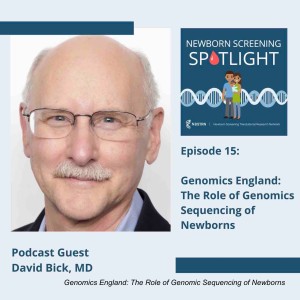
Tuesday Sep 27, 2022
Genomics England: The Role of Genomic Sequencing of Newborns
Tuesday Sep 27, 2022
Tuesday Sep 27, 2022
In the United States, shortly after birth, every newborn receives a series of screening tests to identify treatable diseases. Every September we celebrate this amazing system of research, public health, and clinical care that saves the lives of babies every day with Newborn Screening Awareness month. Neonatal screening also occurs around the world and many countries are working on innovative approaches to use genomics to significantly expand, or improve, our ability to screen, diagnose, and treat hundreds if not thousands of additional diseases. We are excited to feature one of these innovators on the Newborn Screening Spotlight, Dr. David Bick who, is the Principal Clinician for the Newborn Genomes Programme at Genomics England. Genomics England is undertaking an effort to include genomics in neonatal screening.
Prior to his work in England, he was the Chief Medical Officer and a faculty investigator at the HudsonAlpha Institute for Biotechnology. He came to HudsonAlpha from the Medical College of Wisconsin where he was Professor in the Department of Pediatrics and the Department of Obstetrics & Gynecology at the Medical College of Wisconsin. At the Medical College of Wisconsin he was the Director of the Clinical Sequencing Laboratory, Director of the Advanced Genomics Laboratory at Children’s Hospital of Wisconsin, Medical Director of the Genetics Clinic at Children’s Hospital of Wisconsin, and Chief of the Division of Genetics in the Department of Pediatrics at Medical College of Wisconsin.
Dr. Bick received his medical degree from George Washington University School of Medicine in 1981 and completed his residency in Pediatrics at Yale-New Haven Hospital in New Haven, CT. At the Yale University School of Medicine, Dr. Bick completed a fellowship in Human Genetics and Pediatrics in 1986, followed by a post-doctoral research fellowship in Human Genetics in 1987. Dr. Bick is board certified in Pediatrics, Clinical Genetics, and Clinical Molecular Genetics.
He is a leader in the field of genomic medicine and has published numerous peer-reviewed articles, chapters, and reviews. Dr. Bick’s laboratories at the Medical College of Wisconsin and Children’s Hospital of Wisconsin were the first in the world to offer whole genome sequencing as a clinical test. He also developed the first Genomic Medicine Clinic in the United States. Join us as we learn about the role of genomic sequencing of newborns.
Podcast Interview Questions for Dr. David Bick
- Bick, thank you for joining us for the newborn screening SPOTlight podcast, we would love for our listeners to get know you and the impact you’ve made on clinical genomic medicine, newborn screening research. You’re a pediatrician, researcher, and leader in genomic medicine. How did you get involve with newborn screening research?
- You were a faculty in the Department of Pediatrics and the Department of Obstetrics & Gynecology at the Medical College of Wisconsin, where your laboratory was the first to offer whole genome sequencing as a clinical test. What advice can you share for others who are interested in proposing the implementation of genome sequencing in their hospitals?
- You have now moved to the UK to be the Principal Clinician for the Newborn Genomes Programme at Genomics England. Can you tell our listeners more about this program?
- From your experiences at the Screen4Care consortium and the European collaborative Innovative Medicines Initiative, what are lessons that we in the US can learn from?
- In your recent publication titled “Newborn Screening by Genomic Sequencing: Opportunities and Challenges,” you describe the need for “standardization of data formats and analytical approaches within and even between health systems” to support newborn screening by genome sequencing. There are differences between the UK and US health care delivery system. How do you envision this process of standardization in the UK? How can the US with its various health care delivery systems and health insurance plans be able to adopt a similar approach?
- Are you involved in training the next generation of pediatrician nd what do you tell them about newborn screening research?
- What role could NBSTRN play to support international efforts in advancing rare disease research and screening for diseases for which early intervention may improve outcome?
- What does NBS research mean to you?
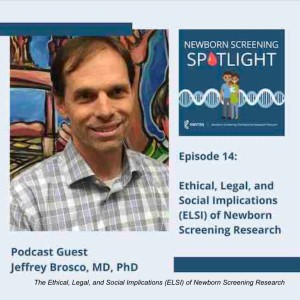
Wednesday Aug 31, 2022
The Ethical, Legal, and Social Implications (ELSI) of Newborn Screening Research
Wednesday Aug 31, 2022
Wednesday Aug 31, 2022
We are excited to welcome Dr. Jeffrey Brosco to the NBSTRN SPOTlight today. Dr. Brosco will share moving stories from his lifetime of experiences caring for children and families as a clinician who specializes in Developmental-Behavioral Pediatrics. Dr. Brosco has both an M.D. and a Ph.D. degrees from the University of Pennsylvania, and he serves as Florida’s Title V Director for Children and Youth with Special Health Care Needs. Dr. Brosco has written numerous articles on the ethical, legal, social implications of newborn screening and along with Diane Paul, he authored a book called The PKU Paradox: A Short History of a Genetic Disease. In 2019 Dr. Brosco was awarded the Maternal and Child Health Bureau Director’s Award for contributions to the health of infants, mothers, children, adolescents, and children with special health care needs across the United States. Listen along with us as Dr. Brosco discusses a wide range of topics including the use of genomics to help end the diagnostic odyssey for families.
Podcast Interview Questions for Dr. Jeff Brosco
- You are a pediatrician with a specialty in Developmental-Behavioral Pediatrics and also currently the State of Florida’s Title V Director for Children and Youth with Special Health Care Needs.How did you get involved with newborn screening research? (Perhaps, you can give our listeners some background on Title V and your role as the director in your response).
- You have written numerous articles on the ethical, legal, social implications of newborn screening. In one of your articles, you mentioned that whole and exome sequencing can add medical insights for families in the ‘diagnostic odyssey’ but in some case, families are still on the therapeutic odyssey. Here, you proposed a family-center approach to care in the genomic era. Could you elaborate to our listeners what this would be?
- Research helps to advance newborn screening by increasing the number of conditions that may be a fit for early identification and intervention. Where do you think the next decade of research will take newborn screening?
- In your recent publication, titled “Newborn Screening in Latin America: A Window on the Evolution of Health Policy,” you hypothesized that the history of NBS programs could be used to understand the development of health policy. Please share some of your takeaways from this effort and which comes first – NBS expansion or health policy – or are they intertwined? Are there unique game changers from a historical perspective that resulted in significant change?
- Are you involved in training the next generation of developmental-behavioral pediatricians and what do you tell them about newborn screening research?
- You played a key role in advancing the efforts of the NBSTRN for many years. What role does NBSTRN play? What role could NBSTRN play in your efforts to addressing the ethical, legal, social implications of NBS?
- As you think about your career as a clinician, are there any patient or family stories that you’d like to share with our audience?
- What does NBS research mean to you?
To become a member of NBSTRN, sign up a free membership account at www.nbstrn.org
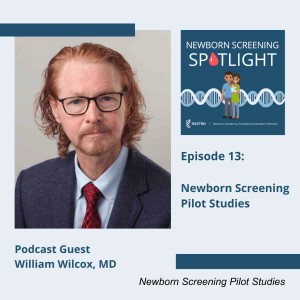
Wednesday Jul 27, 2022
Newborn Screening Pilot Studies
Wednesday Jul 27, 2022
Wednesday Jul 27, 2022
Today on the Newborn SPOTlight we welcome a national leader in newborn screening research and clinical care, Dr. William Wilcox.
Dr. Wilcox is the medical director of the Emory Lysosomal Storage Disease Center and Genetic Clinical Trials Center in Georgia. He was a medical graduate of the UCLA School of Medicine and completed his residency in Pediatrics at UCLA and a genetics fellowship in the UCLA Intercampus Medical Genetics Training Program. As a clinician, Dr. Wilcox also leads clinical trials to discover new treatments for both metabolic and skeletal diseases. Amazingly he has published more than 140 peer-reviewed articles and serves as a member of the Georgia Newborn Screening Advisory Committee.
Dr. Wilcox and his team at Emory have conducted groundbreaking efforts and screened over one million newborns to help to increase the number of conditions that are included in newborn screening in the United States. Join us as we hear from a leader in newborn screening research Dr. Wilcox and listen as he shares what newborn screening research means to him.
Interview Questions:
- You are a pediatrician with a specialty in genetics and you have led many Your research has focused on the clinical description and molecular pathogenesis of conditions that are part of or candidates for newborn screening. How did you get involved with newborn screening research?
- You’re currently the medical director of the Emory Lysosomal Storage Disease Center and Genetic Clinical Trials Center. You are the lead researcher, called the Principal Investigator or PI, for the NICHD funded pilot studies for several conditions. This effort that you and your team at Emory lead in Georgia makes up one of three states that conduct pilots. Can you tell us the goals of this NICHD program, explain where it fits as conditions move from candidates to nationwide screening?
- As a clinician you care for newborns, children, and their families. What role do they play in newborn screening research and pilots?
- Through the years parents and advocates have played key roles in advancing NBS research and practice. You have been on advisory committees, local, state, and national. Do you have any stories you’d like to share with our audience about your own advocacy and that of your patients and families?
- Are you involved in training the next generation of pediatricians and what do you tell them about newborn screening research?
- You have been a member of the NBSTRN since the beginning of 2008 as a member of the Steering Committee. Can you describe your experience with the NBSTRN over the past decade?
- What other support and resources do you think could help facilitate the implementation of statewide pilot studies?
- What does NBS research mean to you?
To learn more about the Georgia Newborn Screening Program, visit https://dph.georgia.gov/NBS
Become a member of NBSTRN by signing up for a free account at www.nbstrn.org
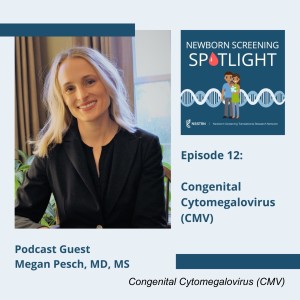
Tuesday Jun 21, 2022
Congenital Cytomegalovirus (CMV)
Tuesday Jun 21, 2022
Tuesday Jun 21, 2022
Listen as Dr. Megan Pesch shares her journey to becoming a parent advocate and a researcher in Cytomegalovirus (also called CMV). Dr. Pesch is an Assistant Professor of Developmental and Behavioral Pediatrics at the University of Michigan where she is the Director of the Congenital CMV Developmental Follow-up Clinic. Dr. Pesch completed her medical school training, residency, and fellowship at the University of Michigan. She is board certified in Developmental and Behavioral Pediatrics and serves as the President-elect of the National CMV Foundation.
Dr. Pesch’s youngest daughter has a profound bilateral sensorineural hearing loss from congenital CMV and this led to her involvement in national advocacy efforts to ensure that all newborns receive CMV screening. Dr. Pesch’s clinical interests include the early diagnosis and treatment of congenital CMV using a multidisciplinary approach with a focus on family care and support, while her research focuses on healthcare provider practices around congenital CMV diagnosis and management and understanding the relationship between autism and CMV.
The month of June is CMV awareness month. Please visit the National CMV foundation to learn more about advocacy efforts in CMV in your area and how you can support NBS for CMV.
Learn more about Dr. Megan Pesch and her advocacy effort on newborn screening for CMV:
https://ihpi.umich.edu/our-experts/pesch
Podcast Interview Question with Dr. Megan Pesch.
- You are currently an Assistant Professor of Developmental and Behavioral Pediatrics and the Director of the Congenital CMV Developmental Follow-up Clinic at the University of Michigan. Can you tell our listeners more about CMV and how it impacts mothers, their babies and families? (perhaps, talk about the differences between prenatal CMV and neonatal congenital CMV)?
- You are a clinician and a researcher, and lead efforts in the Pesch Lab at Michigan Medicine at the University of Michigan! One of your projects brings together a multidisciplinary group of health care providers to refer infants who fail their newborn hearing screen for congenital cytomegalovirus testing. Tell us more about this important project and explain how you got involved in newborn screening research?
- Currently, there is no standard of care or routine screening for newborns for congenital cytomegalovirus at birth. What can parents do if they suspect their baby has CMV? (perhaps discuss the Alethia CMV Assay Test System)
- What is hearing targeted early cytomegalovirus (HT-CMV) screening?
- One of your current studies seeks to understand the possible connection between exposure to CMV during pregnancy and the later risk of autism. Can you tell us more about this effort? What are you hoping to learn? What is the biological pathway?
- You are also the President-elect of the National CMV Foundation. What are some of the current activities or programs that people can get involved in your advocacy efforts? What are the recent advocacy efforts to support newborn screening for CMV? Is it currently being reviewed to be added to the RUSP?
- Are you involved in training the next generation of pediatricians, and what do you tell them about newborn screening research?
- You are busy as a clinician, researcher, advocate, and parent. Do you have any stories of inspiration that keep you going?
- What does NBS research mean to you?
To learn how NBSTRN can help your research in newborn screening, visit www.nbstrn.org
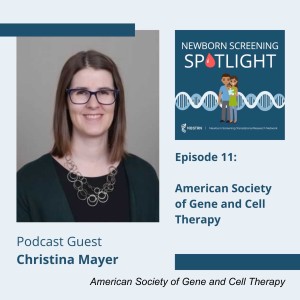
Monday May 09, 2022
American Society of Gene and Cell Therapy
Monday May 09, 2022
Monday May 09, 2022
Advances in gene and cell therapies are enabling researchers, clinicians, families, and regulators to work together in incredible new ways to treat previously untreatable conditions.
Listen to Christina Mayer share her efforts to advance policies that help to realize a future where gene and cell therapies are available to all individuals for all diseases. Christina is currently the Senior Manager of Government Affairs at the American Society of Gene and Cell Therapy in Milwaukee, Wisconsin. She works with federal government agencies and decision-makers to impact key components of gene and cell therapies like NIH research funding, genetic testing and screening, payment policy and patient access to approved therapies. She also contributes to the Society’s work on other policy priorities, such as regulatory oversight and the responsible use of new genetic technologies. Christina has a Master of Public Administration from the University of Nebraska-Omaha.
Listen with us as we imagine a future where the availability and equitable use of gene and cell therapies helps to realize the promise of a healthy future for all.
Podcast Interview Questions with Christina Mayer:
1. You are currently the Senior Manager of Government Affairs at the American Society of Gene and Cell Therapy. Can you tell us about the mission of the American Society of Gene and Cell Therapy? What is your role there?
2. What an exciting and rewarding time to advocate for gene and cell therapies! ASGCT reminds us all that there are literally 1000s of clinical trials for novel therapies and over the next decade there will be about 30 approved therapies for genetic disease, not counting cancer. What can our listeners do to become more aware of these efforts and to become advocates for continued advancement and access to these life-saving and in many cases disease curing therapies?
3. In its 2020 – 2022 strategic plan, ASGCT identified access to genetic testing and screening as one of its core patient access priorities. What efforts have been made by ASGCT to advance access to genetic testing and screening in newborns? Can you describe ways that the current approach to newborn screening in the United States could be improved to enable the use of gene and cell therapies? What are ways that our listeners can get connected to your organization?
4. In Feb 2021, ASGCT provided a public comment to Advisory Committee on Heritable Diseases in Newborns and Children (ACHDNC) on the newborn screening process.In this letter, ASGCT stated its support of the Newborn Screening Saves Lives Act. Can you tell us listeners more about the history of this act? Why is it important that it get passed? What would happen if it doesn’t?
5. Also, in the letter, ASGCT offers three recommendations to the ACHDNC. They are: 1) Ensure the RUSP keeps pace with treatment approvals, 2) Collaborate with and rely upon the FDA, and 3) Ensure the process to advance a disorder through the ACHDNC is transparent, predictable,and timely. Would you mind sharing the evidence that supported each of recommendations? (Perhaps, discuss the problem and why this recommendation would solve that problem)
6. ASGCT has worked partner organizations to support other NBS and you are hosting a workgroup and symposium in May to discuss advancements in NBS. Thank you for inviting Dr. Brower and NBSTRN to present during the workshop. Please tell us more about these important events and how they can participate.
7. You and Dr. Brower serve on the planning committee for an effort by EveryLife Foundation to develop actionable policy solutions aimed at ensuring newborn screening continues to advance. This includes the research facilitated by NBSTRN and ASGCT, as well as the policies that you and your team champion. Can you describe why these types of efforts to build coalitions and collaborations across different stakeholder groups are so important?
8. You have a very interesting career path and your work inspires many of us to achieve meaningful change and work to advance discoveries that save and improve lives. Can you share with our listeners what sparked your interest in the revolution that is gene and cell therapy as well as newborn screening research?
9. What does NBS research mean to you?
Learn more about ASGCT annual meeting at https://annualmeeting.asgct.org
To learn more about newborn screening research data tools and resources, visit www.nbstrn.org
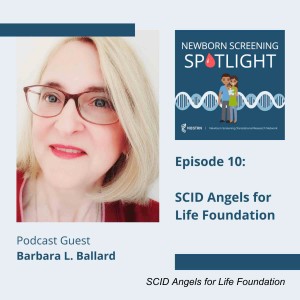
Monday Apr 11, 2022
SCID Angels for Life Foundation
Monday Apr 11, 2022
Monday Apr 11, 2022
Listen as Barb Ballard shares her long history of advocacy and innovative efforts in newborn screening. Barb is currently the Director of SCID Angels for Life Foundation. Her involvement with the non-profit sector began after her son, Ray, born in 1994, was diagnosed at 10 ½ months old with X-Linked Severe Combined Immune Deficiency, commonly known as the Bubble Boy Disease. Barb served on the Board of Trustees for The Immune Deficiency Foundation for 18 years, where she advocated for the interests of parents, families and individuals living with immune deficiency at numerous state, and federal committees, while developing the SCID Initiative Program. While her son was hospitalized as a baby at Duke University, Barb developed the first list-serv for families of children diagnosed with SCID. Be inspired by Barb’s story of perseverance, determination, and dedication in supporting families facing genetic disease.
Interview Questions with Barb Ballard:
1. What is the mission of your organization (perhaps, here you can discuss your grant and scholarship program, community engagement activities, and resources on clinical trials)?
2. Barb had a child with SCID who also touched many lives and his story directly and indirectly led to changes in the way newborns are screened, diagnosed, and treated for immune deficiencies. Can you tell our listeners about his life and your hopes for his legacy?
3. Before Ray was diagnosed with SCID were you aware of newborn screening? What do you think prospective parents should know about newborn screening – not only for SCID but other conditions?
4. Because SCID is a spectrum of different genetic variations (or changes, we used to call them mutations) and needs of patients with SCID vary drastically, how do you engage clinical research partners to understand the needs and concerns of the patient population?
5. What are some of the current efforts of SCID Angels for Life organization in disseminating information on new clinical research?
6. What role does your Facebook or other social channels help to support families whose newborn screens positive for SCID? Are there things that national groups like NIH, CDC and HRSA could be doing to support new families?
7. Your organization also currently manages three scholarship programs to support families: Family Scholarship, Travel Scholarship, and Education Scholarship. How could our listeners learn more about these programs? (perhaps you talk about the application process, deadline, qualifications)
8. You have hosted several Town Halls and other informational webinars on new information or clinical trials where the patients and their families are looking to have their questions answered directly. What are some of the common frequently asked questions?
9. What does NBS research mean to you?
To learn more about SCID Angels for Life, visit http://www.scidangelsforlife.com
If you have a story on how rare disease research has impacted your life and family, please contact NBSTRN to share your story on our podcast. Visit www.nbstrn.org
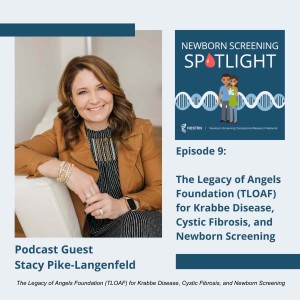
Monday Feb 28, 2022
Monday Feb 28, 2022
In this episode, we welcome Stacy L. Pike-Langenfeld to the Newborn Screening SPOTlight. For many years, Stacy and her family have championed newborn screening research in profound ways through their foundation, called The Legacy of Angels Foundation. Stacy is currently the Executive Director of the foundation which was established in 2008 by Stacy’s parents, Paul and the late-Sue Rosenau. The Foundation helps to advance research by bringing world experts together to discover innovations in screening, diagnosis, treatment, and life-long care. Stacy is also the President and co-founder of KrabbeConnect, which is focused on engaging the patient-care model between patients, patient advocacy groups, clinicians, researchers, industry, and government.
Stacy will share her story on how her family story intertwined with rare disease research and newborn screening. She will also highlight annual meetings and discuss ways that you can help advance NBS research. Be inspired by their mission to increase awareness and access to rare disease research.
Podcast Interview Questions with Stacy Pike-Langenfeld:
1. You are the Executive Director of The Legacy of Angels Foundation. Can you tell our audience how The Legacy of Angels Foundation came to be?
2. Your entire family has played important roles in founding and operating The Legacy of Angels Foundation for many years. Your mother’s efforts are especially well known in the newborn screening and rare disease communities. How does her memory guide your efforts today?
3. How have your efforts changed over the years?
4. Your team is growing! Do you have advice for patients, parents, families, and advocates who would like to start similar efforts related to conditions that have impacted their families?
5. Stacy, you are also the President and Co-Founder of KrabbeConnect. What is KrabbeConnect? Could you share with our listeners how these two organizations, The Legacy of Angels Foundation and KrabbeConnect work together?
6. TLOAF filed for Krabbe disease to be added to the MN NBS panel in Dec 2021 and a vote will likely occur in June of 2022. Newborn screening for Krabbe is also under review on a national level. Could you tell us a little bit about how submitting to a state advisory panel differs from a submission to the federal advisory board, which recommends screening for all states, territories and the District of Columbia?
7. Do you have advice for other groups interested in submitting their conditions for review? Any tips on the best approach – state or national?
8. The work of The Legacy of Angels Foundation has always informed the work of the Newborn Screening Translational Research Network or NBSTRN. Are there activities and efforts that you’d like to see NBSTRN facilitate as you work towards new goals?
9. Krabbe Translational Research Network is hosting its annual meeting on March 16-18, 2022? Could you share the agenda with our listeners? If our listeners are listening to this podcast after the meeting, is there a way for them to learn more?
10. What does NBS research mean to you?
Learn more about The Legacy of Angels Foundation (TLOAF) at https://www.tloaf.org
Become a member of the Newborn Screening Translational Research Network (NBSTRN) to help advance newborn screening research. Visit NBSTRN at www.nbstrn.org
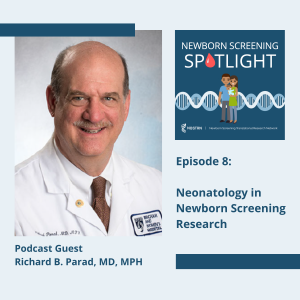
Monday Jan 31, 2022
Neonatology in Newborn Screening Research
Monday Jan 31, 2022
Monday Jan 31, 2022
In this episode, listen as Dr. Richard Parad, a Neonatologist and the Director of the Newborn Genomics Program in the Department of Pediatric Newborn Medicine at Brigham and Women’s Hospital, Boston, MA shares his journey to save babies through newborn screening (NBS). Thirty years ago, the discovery of the gene for cystic fibrosis (CF) fueled Dr. Parad’s research in NBS, and led to Massachusetts being one of the first to screen newborns for CF. Dr. Parad has continued to bring innovation to NBS research as the principal investigator in a five-year study of genomic screening in newborns, called BabySeq, and the leader of a new hospital-based supplemental Duchenne Muscular Dystrophy newborn screening program. His interest in integrating genomic sequencing platforms into newborn screening has led to developing pilot programs for newborn genomic screening of cancer predisposition syndromes, such as retinoblastoma, and Menkes disease. We are excited to share Dr. Parad’s efforts and passion for NBS research.
Interview Questions with Dr. Parad:
- You are a neonatologist. How did you get involved with newborn screening research?
- You have published on groundbreaking efforts in diverse diseases from cystic fibrosis to congenital heart disease. Were there experiences during your care of babies in the NICU that led you to lead a pilot of newborn screening for Duchenne Muscular Dystrophy?
- You and your colleagues presented at the NBSTRN Research Summit on the early detection of pediatric cancer predisposition. Can you describe your goals with this effort and how this could advance pediatric cancer research?
- What is BabySeq?a
- Are you involved in training the next generation of neonatologists and what do you tell them about newborn screening research?
- You have been a member of the NBSTRN. What role does NBSTRN play? What role could NBSTRN play in your efforts to help ensure that all babies have the healthiest future possible, and screening for diseases for which early intervention may improve outcome?
- What does NBS research mean to you?
To learn how to get involved in newborn screening research, visit www.nbstrn.org
